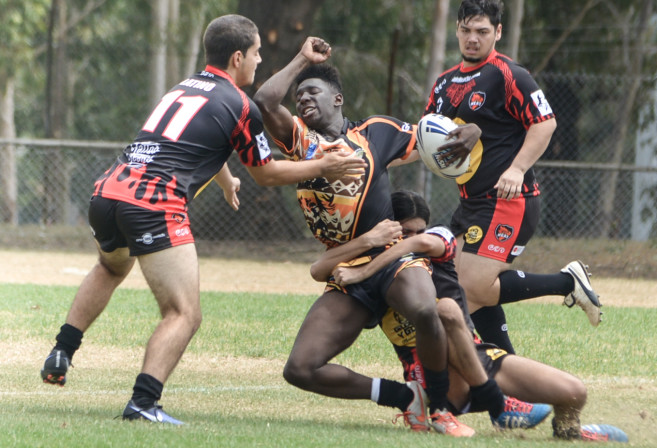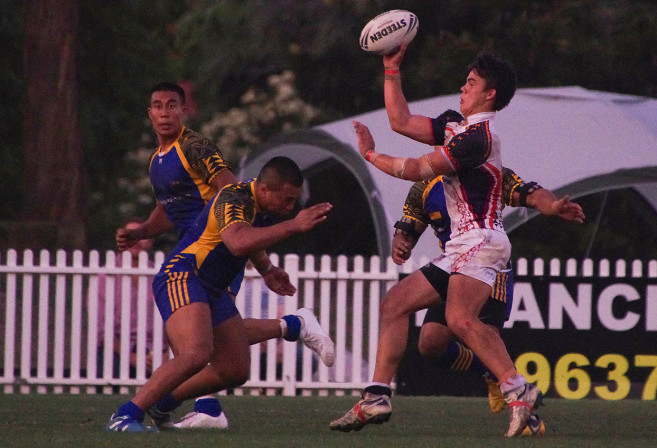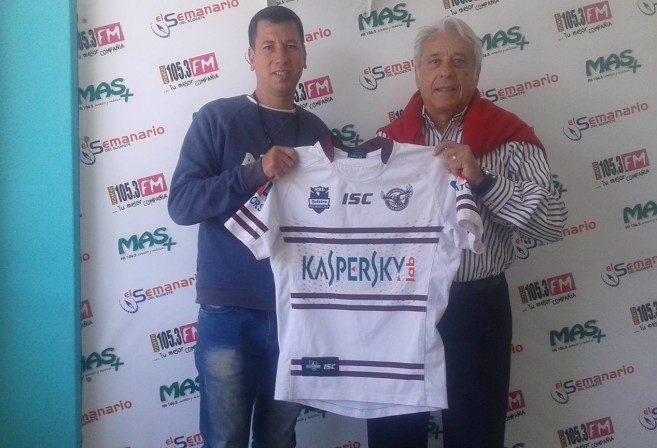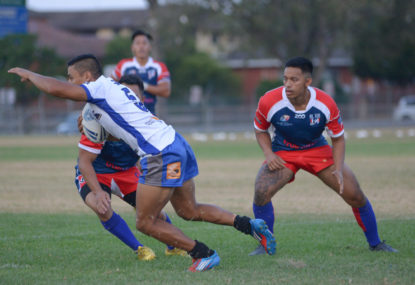A veteran administrator once said to me of the Rugby League International Federation (RLIF): “They tend to the sport like it’s a Vikings’ harvest.”
It seemed a curious phrase at the time, but the analogy soon became clear.
“They’ll expect you to fund the equipment, plant the seeds and do all the work,” he bristled.
“If anything ever grows, they’ll come along, plunder it and claim it as their own – otherwise you’ll be lucky if they look sidewards at you.”
As someone who harboured ambitions of growing the sport throughout Latin America, I initially thought the comments bordered on negative and defeatist, though I had no doubt they came from a well-meaning place.
This bloke simply didn’t want to see me waste my time and get chewed up and spat out like others before.
And to be fair, his turn of phrase was decidedly less dramatic than another description of dealing with the RLIF which landed in my inbox this week which read, “It’s like being in an abusive relationship.”
The reason for the increase of traffic through my inbox this week is because I broke a story a lot of people in Australia, the United Kingdom and New Zealand probably don’t care an awful lot about.
Back in January, essentially under a veil of darkness, the RLIF – at the behest of 2017 Rugby League World Cup (RLWC) organisers – blocked the hosting of the 2017 Emerging Nations World Cup (ENWC) in November.
For those of you unfamiliar, the Emerging Nations has been held twice before in conjunction with the fully-fledged World Cup and generally involves teams from the developing tiers of the game.
The 2017 ENWC had already received a bond from 14 confirmed teams and teams had signed sponsors, started to organise travel, accommodation and insurance, held diplomatic discussions, and developed an entire calendar around the event being played.
The confirmed participants were Canada, Greece, Hungary, Hong Kong, Philippines, Thailand, Latvia, Malta, Vanuatu and Niue, plus composite teams representing Africa, the Middle East, Scandinavia and Latin America.

Africa United vs Latin Heat (Image: Ahmed Faris)

Philippines vs Niue
Basically it was called off less than 24 hours before the media were scheduled to be advised – despite initial backing by the RLIF, ENWC, and NRL, and months of exchanged emails and meetings.
Without turning this into a 100,000-word essay, the crux is that the RLWC2017 officials felt the smaller, self-funded tournament between minnow nations would dilute its branding and somehow be a threat.
That whole notion in itself speaks volumes.
A tournament that had run successfully in synchronicity before; that was unlikely to have more than a handful of professional athletes playing at modest stadiums; held at non-conflicting times; would somehow steal the thunder of a top-level tournament with significant media and promotional power?
Right.
To further summarise the story, what gave it some oomph was the subsequent fall-out and the uncomfortable revelation that up to a dozen countries were now considering forming a breakaway federation.
You can understand this when many countries have been surviving for years on chickenfeed, doing the job the RLIF should be, then getting told a major opportunity and incentive is being taken away on a whim.
There’s that Vikings’ harvest old mate forewarned me about.
As I pointed out in a discussion with fellow Roar columnist Stuart McLennan, the ENWC is not the most important topic in rugby league, but it is representative of a wider pervading attitude and mode of operation.
There are several countries in Asia that have been gallantly flying the flag for rugby league in exchange for the occasional bundle of free footballs, while their rugby union counterparts collect annual cheques well into six figures.
Eastern European countries can’t get funding for basic necessities like referees and uniforms, raising questions about where all the money received from the European Union has gone.
In the case of Latin America, I’d be wholly surprised if anyone else in the RLIF aside from Development Officer Tas Baitieri and his hard-working assistant Anna Byrne knows the names of a single person who lives in the continent and administers the sport.
The RLIF mentions countries in its annual report and global rankings that it has never sent an email to, largely because the more countries and new regions it looks to be engaging, the bigger it can look and the more funding it can collect.
A larger issue about the disconnect and distrust simmering between the sport’s two major regional federations – European Federation and Asia Pacific Confederation – is worth its own column at a later point.
People on the frontline in developing nations cannot believe that an international sports organisation operates the way the RLIF does.
Carlos Varela, a 73-year-old retiree in Argentina, has been an amazing administrator for the sport.
 Carlos Varela (right) presenting a Manly jersey to a local radio station in Argentina as part of promoting the sport there.
Carlos Varela (right) presenting a Manly jersey to a local radio station in Argentina as part of promoting the sport there.
He almost single-handedly organised for Chile to play Argentina in a historic game last November, being personally responsible for everything right down to wrangling a better deal for hamburgers and beers on the night of the game.
You better believe he has shelled out bigtime from his pocket to keep the game alive in a country of more than 100,000 union players.
You better believe he was dearly hoping the 2017 ENWC would happen so he could promise his most outstanding players a pathway to higher levels – because otherwise he will keep losing them to union.
You better believe it broke his heart when he heard the flight to Australia he had saved for and booked in November 2017 was rendered useless.
And that’s what people are not seeing.
They reckon the cancellation of the ENWC is a good thing, because it would have been entirely full of heritage players from Australia.
That concept is pure bunkum and all teams were planning to combine heritage and domestic players for the benefit of developing the reach of the code.
All Australian-based representatives of nations were operating in full cooperation with their counterparts back home.
All this move has done is raise questions over the professionalism and integrity of the Rugby League International Federation.
But sadly these are not new questions. It’s just brought them to the fore.
I’ll be very clear in saying that it’s 100 per cent true there is discussion about forming a breakaway federation. It has been discussed, but it’s not what anybody wants the sport to endure.
The peasant farmers are just waiting for the Vikings to get some manners in the meantime.
Until then, here are some important questions to ponder:
If the RLWC2017 was surprised by the ENWC concept, then are we led to believe that there was no forward planning about how the World Cup would engage those 40+ countries on the next tier in November? Had it not been considered what potential wider good this tournament may have or how contacts in these areas might have been helpful?
If ENWC had not come to its own fruition, would there be no plan or involvement for nations which represent a quarter of the world’s population? There was only a hastily thrown-together 2018 plan after they ditched the 2017 tournament.
There are claims ENWC would confuse non-dedicated rugby league followers, despite there being women’s events, military events, and university events happening in a scheduled fashion.
Are we to assume then that for the remainder of the year that nobody knows clearly what the NRL is, because we have multiple competitions such as the QRL, NSWRL, CRL, juniors and schools leagues on? Many of these have finals within weeks of each other and people generally seem to be able to differentiate them.
The RLWC 2017 is claiming they have an exclusivity deal that would legally forbid the ENWC from being held.
Where does this exclusivity extend to? Is it only to cities in which the RLWC2017 is being played? Does it incorporate the whole of PNG and New Zealand as well? If volunteers play in a self-funded tournament, how does this legally differ to a large group of private citizens arranging to meet in one location to play a sport they love?
Further to this point – if an exclusivity deal of such importance was in place, would all nations not have been told this earlier – seeing they regularly compete in the late October timeframe?
Surely this exclusivity deal could be overturned if the RLWC2017 wanted to. And would the RLWC2017 really take the Emerging Nations to court?
When we hear the same tired old accusations thrown at the RLWC that it is a “game played in three countries”, “has no global vision”, and “is only played by countries that were under British colonial rule”, will they refer to the ENWC as their proof of otherwise?
































































































 Carlos Varela (right) presenting a Manly jersey to a local radio station in Argentina as part of promoting the sport there.
Carlos Varela (right) presenting a Manly jersey to a local radio station in Argentina as part of promoting the sport there.